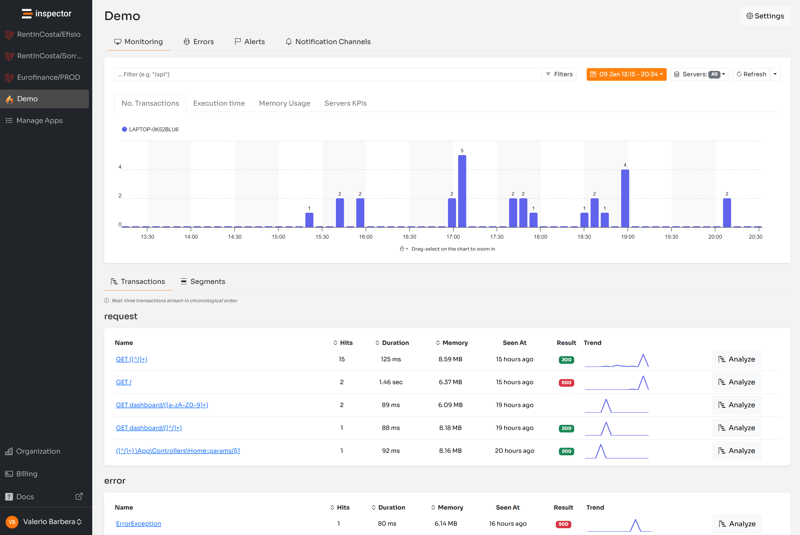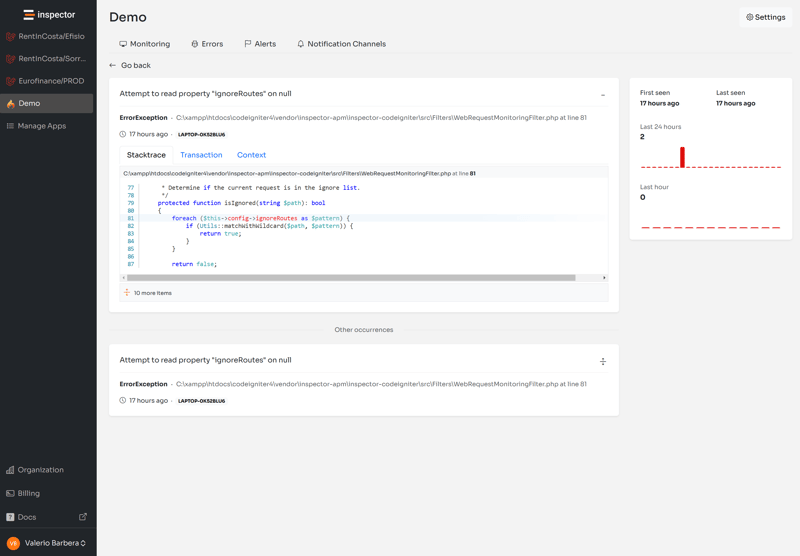 Backend Development
Backend Development
 PHP Tutorial
PHP Tutorial
 CodeIgniter Monitoring Library – Born from Understanding Real Developer Needs
CodeIgniter Monitoring Library – Born from Understanding Real Developer Needs
CodeIgniter Monitoring Library – Born from Understanding Real Developer Needs
I've just finished building the CodeIgniter monitoring package for Inspector APM.
Developing this monitoring library took considerable time, driven by a perceived gap in CodeIgniter framework monitoring solutions. The CodeIgniter community often gets overlooked by larger monitoring platforms.
Sentry, Bugsnag, and similar popular tools lack native CodeIgniter integration, creating challenges for developers. To address this, I've focused on building monitoring libraries for specialized frameworks like Symfony, CodeIgniter, and Slim.
While this might not appeal to large SaaS companies, it's a different story for us. As a bootstrapped startup with two partners, we have the freedom to develop niche products.
Operating from Southern Italy for five years, we've built Inspector from the ground up. After two years, Inspector gained traction, allowing us to delve deeper into specific technologies where robust solutions are lacking.
We've consistently rejected venture capital offers due to their emphasis on scaling for large corporations. Our goal remains assisting software developers with powerful, user-friendly tools. This approach has fueled our steady growth over the past five years.
It's been incredibly rewarding to support developers worldwide (U.S., Australia, Argentina, Kenya, Singapore, Germany, etc.).
The Inspector package for CodeIgniter aims to provide a seamless monitoring solution for CodeIgniter developers, eliminating the need for manual library integration or complex configurations.
The package prioritizes developer experience. As with any CodeIgniter project, improvements are always welcome. Please share your feedback or submit issues via the GitHub repository.
Let's get started!
Installing the CodeIgniter Monitoring Package
Install the latest version using Composer:
<code>composer require inspector-apm/inspector-codeigniter</code>
Then, run the installation command to publish the Inspector.php configuration file to your application's app/Config directory:
<code>php spark inspector:install</code>
Configuring the Ingestion Key
Enable data transfer to your Inspector dashboard by adding the following environment variable to your .env file. Obtain a new Ingestion Key by creating a new application in your account: https://www.php.cn/link/23d6c2965508b167da9c4bdcef3a2aa3
<code>#-------------------------------------------------------------------- # INSPECTOR #-------------------------------------------------------------------- inspector.ingestionKey = '974yn8c34ync8xxxxxxxxxxxxxxxxxxxxxxxxxxxxx'</code>
Verification and Deployment
Verify your configuration:
<code>php spark inspector:test</code>
A successful check indicates readiness for production deployment.
Inspector's default monitoring features include:
- Incoming HTTP requests
- Database queries
- Unhandled exceptions

Helper Function
For global accessibility, add the helper to your Config/Autoload.php:
<code>composer require inspector-apm/inspector-codeigniter</code>
This helper provides shortcuts for monitoring custom code blocks or manually reporting exceptions:
<code>php spark inspector:install</code>
Learn more about custom segments: https://www.php.cn/link/e1241d1b9692c1e9f4ebbf6896f0e33e
Monitoring CodeIgniter Exceptions
Unhandled exceptions are automatically reported for real-time error alerts. Inspector supports various notification channels (Email, Slack, Telegram, Discord, etc.) for integration with your preferred communication platform.
You can manually report exceptions without halting code execution:
<code>#-------------------------------------------------------------------- # INSPECTOR #-------------------------------------------------------------------- inspector.ingestionKey = '974yn8c34ync8xxxxxxxxxxxxxxxxxxxxxxxxxxxxx'</code>
Real-time alerts and stack trace analysis facilitate quick issue identification.

Free CodeIgniter Application Monitoring
Inspector offers free HTTP monitoring, database query analysis, error detection, and customizable alerts. Our first-party library ensures a fully featured, zero-configuration experience.
Learn more: https://www.php.cn/link/3a78f1864ab77dbd239fbe33cae90bbb
The above is the detailed content of CodeIgniter Monitoring Library – Born from Understanding Real Developer Needs. For more information, please follow other related articles on the PHP Chinese website!

Hot AI Tools

Undresser.AI Undress
AI-powered app for creating realistic nude photos

AI Clothes Remover
Online AI tool for removing clothes from photos.

Undress AI Tool
Undress images for free

Clothoff.io
AI clothes remover

Video Face Swap
Swap faces in any video effortlessly with our completely free AI face swap tool!

Hot Article

Hot Tools

Notepad++7.3.1
Easy-to-use and free code editor

SublimeText3 Chinese version
Chinese version, very easy to use

Zend Studio 13.0.1
Powerful PHP integrated development environment

Dreamweaver CS6
Visual web development tools

SublimeText3 Mac version
God-level code editing software (SublimeText3)

Hot Topics
 Alipay PHP SDK transfer error: How to solve the problem of 'Cannot declare class SignData'?
Apr 01, 2025 am 07:21 AM
Alipay PHP SDK transfer error: How to solve the problem of 'Cannot declare class SignData'?
Apr 01, 2025 am 07:21 AM
Alipay PHP...
 Explain JSON Web Tokens (JWT) and their use case in PHP APIs.
Apr 05, 2025 am 12:04 AM
Explain JSON Web Tokens (JWT) and their use case in PHP APIs.
Apr 05, 2025 am 12:04 AM
JWT is an open standard based on JSON, used to securely transmit information between parties, mainly for identity authentication and information exchange. 1. JWT consists of three parts: Header, Payload and Signature. 2. The working principle of JWT includes three steps: generating JWT, verifying JWT and parsing Payload. 3. When using JWT for authentication in PHP, JWT can be generated and verified, and user role and permission information can be included in advanced usage. 4. Common errors include signature verification failure, token expiration, and payload oversized. Debugging skills include using debugging tools and logging. 5. Performance optimization and best practices include using appropriate signature algorithms, setting validity periods reasonably,
 How does session hijacking work and how can you mitigate it in PHP?
Apr 06, 2025 am 12:02 AM
How does session hijacking work and how can you mitigate it in PHP?
Apr 06, 2025 am 12:02 AM
Session hijacking can be achieved through the following steps: 1. Obtain the session ID, 2. Use the session ID, 3. Keep the session active. The methods to prevent session hijacking in PHP include: 1. Use the session_regenerate_id() function to regenerate the session ID, 2. Store session data through the database, 3. Ensure that all session data is transmitted through HTTPS.
 How to debug CLI mode in PHPStorm?
Apr 01, 2025 pm 02:57 PM
How to debug CLI mode in PHPStorm?
Apr 01, 2025 pm 02:57 PM
How to debug CLI mode in PHPStorm? When developing with PHPStorm, sometimes we need to debug PHP in command line interface (CLI) mode...
 Describe the SOLID principles and how they apply to PHP development.
Apr 03, 2025 am 12:04 AM
Describe the SOLID principles and how they apply to PHP development.
Apr 03, 2025 am 12:04 AM
The application of SOLID principle in PHP development includes: 1. Single responsibility principle (SRP): Each class is responsible for only one function. 2. Open and close principle (OCP): Changes are achieved through extension rather than modification. 3. Lisch's Substitution Principle (LSP): Subclasses can replace base classes without affecting program accuracy. 4. Interface isolation principle (ISP): Use fine-grained interfaces to avoid dependencies and unused methods. 5. Dependency inversion principle (DIP): High and low-level modules rely on abstraction and are implemented through dependency injection.
 How to automatically set permissions of unixsocket after system restart?
Mar 31, 2025 pm 11:54 PM
How to automatically set permissions of unixsocket after system restart?
Mar 31, 2025 pm 11:54 PM
How to automatically set the permissions of unixsocket after the system restarts. Every time the system restarts, we need to execute the following command to modify the permissions of unixsocket: sudo...
 How to send a POST request containing JSON data using PHP's cURL library?
Apr 01, 2025 pm 03:12 PM
How to send a POST request containing JSON data using PHP's cURL library?
Apr 01, 2025 pm 03:12 PM
Sending JSON data using PHP's cURL library In PHP development, it is often necessary to interact with external APIs. One of the common ways is to use cURL library to send POST�...
 Explain late static binding in PHP (static::).
Apr 03, 2025 am 12:04 AM
Explain late static binding in PHP (static::).
Apr 03, 2025 am 12:04 AM
Static binding (static::) implements late static binding (LSB) in PHP, allowing calling classes to be referenced in static contexts rather than defining classes. 1) The parsing process is performed at runtime, 2) Look up the call class in the inheritance relationship, 3) It may bring performance overhead.





